|
European Language Gazette
No. 68 – January-April 2024 | |
Content of this newsletter
| |
|
Featured articles |
|
2024 = 30 + 75!
ECML and Council of Europe anniversaries |
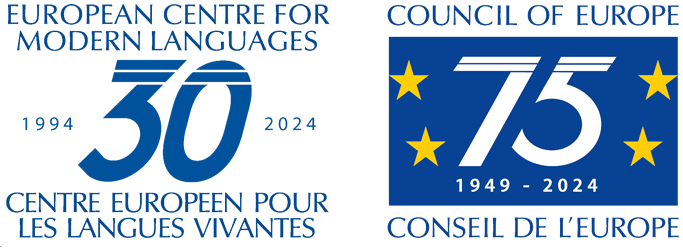 |
|
2024 marks the 75th anniversary of the Council of Europe and the 30th anniversary of its European Centre for Modern Languages. The ECML, which was established as an Enlarged Partial Agreement of the Council of Europe under Committee of Ministers’ Resolution (94)10 of 9 April 1994, started life with just 8 member states. The re-accession of Spain last year brought the Centre's membership up to its highest ever level of 36 states. The key issues in language education and member state priorities may have changed significantly over the past 30 years but the ECML’s influence, thanks to its close alignment with the needs of states at national level, has continued to grow. The Centre's programme for 2024-27, “Language education at the heart of democracy” aims to continue this trend. It was developed in close coordination with member states and takes account of common values and priorities, as well as emerging needs.
A series of events in Austria are scheduled in the coming months in celebration of this dual anniversary. Those below illustrate the substantial interest in the ECML - also beyond the area of language education:
- 23 April – 9 May: A series of political education action days will be coordinated by the Austrian Federal Ministry of Education, Science and Research.
- 3 May: A conference of the European association of former members of parliament of the member states of the Council of Europe (FP-AP) will be held at the ECML. The President of FP-AP is the former Council of Europe Secretary General, Walter Schwimmer.
- 16 May: The ECML Executive Director will address Austrian elected representatives at the Regional Parliament (Landhaus) of Styria.
- 24 October: The meeting of the Austrian Language Committee (ÖSKO) will be held at the ECML.
| |
|
“A Council of Europe Recommendation on language education: challenging societal attitudes towards language and culture” – Webinar recording (22 February 2024) |
|
The Recommendation CM/Rec (2022) on the importance of plurilingual and intercultural education for democratic culture is the first holistic recommendation on language education to be published by the Council of Europe. Its scope extends beyond formal education, recognising that successful implementation requires a shift in societal attitudes to language and culture. In the fourth webinar in the series, Terry Lamb (Professor of Languages and Interdisciplinary Pedagogy, University of Westminster, President FIPLV) explored the ways in which a wide range of stakeholder groups and partners in civil society can collaborate with educational institutions to contribute to this broad and ambitious agenda for change.
| |
|
|
ECML activities |
|
“Language education at the heart of democracy”: launch of the ECML programme 2024-27 |
|
In January 2024, the European Centre for Modern Languages (ECML) launched its 7th medium-term programme of activities, “Language education at the heart of democracy”. The programme is based on identified priorities in language education of the Centre’s 36 member states. With its unique position at the interface between policy, research, teacher education and classroom practice, the programme will focus primarily on activities to support and further develop the wellbeing, resilience and competences of all those working in the field, so that they in turn can empower their learners. In this way, it aims to transform language education into a vibrant force at the core of democratic ideals.
The new programme is organised in two strands.
The development strand includes:
The mediation strand includes:
| |
|
New ECML project: “CLIL teaching materials for developing 21st century competences” – Expert meeting (Graz, Austria, 27-29 February 2024) |
|
The main aim of the project (2024-2026) is to create CLIL teaching materials for different language and subject combinations that will help secondary school learners to develop the 21st century competences needed to engage critically with the type of global challenges addressed through the United Nations Sustainable Development Goals (SDGs).
Full news item
| |
|
New ECML project: The project “Fostering the plurilingual wellbeing of language teachers” is underway! Expert meeting (Graz, Austria, 29 February – 1st March 2024) |
|
The project “Fostering the plurilingual wellbeing of language teachers” (2024-2026) will help teachers recognise and value the potential of their own language repertoire and how they use their languages to interact positively within their personal and professional contexts. Tools and resources will be designed together with teachers and for teachers and will aim to support the development of their plurilingual wellbeing.
Full news item
| |
|
ECML Training and consultancy (TaC) activities in 2024 |
|
ECML training and consultancy (TaC) activities seek to trigger innovation; the starting point is a meeting in Graz where ECML TaC teams plan the national events together with the local organisers from the selected member states. The 2024 meeting on 15 February involving some 50 participants focused on strategies for identifying participants at national level, as well as how to best ensure alignment of TaC events with national developments and how to promote follow-up work and further development at national level.
The ECML secretariat is currently organising 21 training workshops in 17 member states which will take place in the course of 2024 within the core programme. ECML Training and consultancy offers
Full ECML news item
| |
|
ECML-EC cooperation: Summer academy for teacher educators working in the field of languages – “Inspiring innovation in European language teacher education” (Graz, 24-28 June 2024) |
|
The summer academy provides a unique opportunity for the professional learning of language teacher educators, so that they, in turn, can support the professional development of language teachers to respond to the complex needs of today’s learners. Focusing on developments at the cutting edge of language education as reflected in the ECML thematic areas, the programme provides teacher educators with opportunities to pool their expertise with colleagues from across Europe and to reflect on and re-think their own modes of teacher education from a transnational perspective.
The call for the 2024 ECML summer academy is open until 22 April. This is the third event of its kind carried out in cooperation with the European Commission.
For inquiries related to applying, please contact the National nominating authority for your country.
Draft programme
| |
|
The ECML welcomed the President of the Congress of Local and Regional Authorities |
|
On 7 February the President of the Congress of Local and Regional Authorities, Marc Cools, visited the European Centre for Modern Languages together with Inge Hannon from the Current Affairs Committee and Klaus Starl and Livia Perschy from the International Centre for the Promotion of Human Rights at the Local and Regional Levels under the auspices of UNESCO.
This meeting marked the first in a series of events designed to put the ECML’s work in language education in the political spotlight in this double anniversary year, 2024, marking 30 years of the ECML and 75 years of the wider Council of Europe.
ECML full news item
| |
|
|
Recent publications |
|
ECML publications |
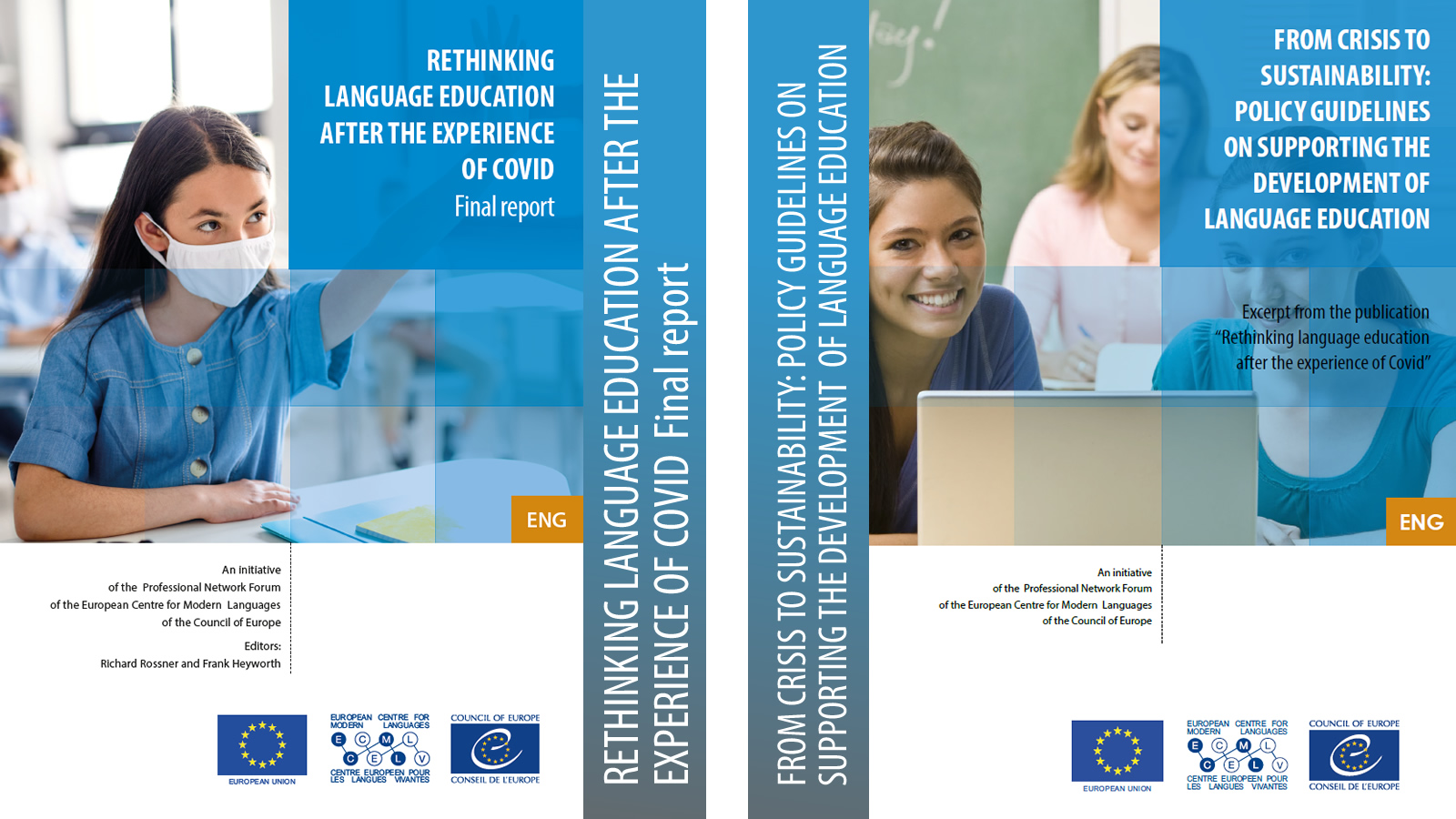 |
|
Rethinking language education after the experience of Covid – Final report (2023)
This publication offers both a timely reflection on the challenges faced and the approaches developed over the course of the pandemic and a look into the future at ways in which the skills and insights gained may bring about beneficial lasting changes in the teaching and learning of languages.
From crisis to sustainability: policy guidelines on supporting the development of language education (2023) – Excerpt from the publication Rethinking language education after the experience of Covid
The Policy Guidelines are intended to assist and provide food for thought for policy makers in education authorities in Council of Europe member states. They are also relevant for those at institutional level responsible for overseeing and managing language education and the provision of teacher education for future and practising language teachers.
Both outputs were developed and published with the support of the European Commission.
| |
|
ECML multilingual glossary of key terms in language education |
|
The ECML glossary now includes 924 key terms, definitions and references used in ECML projects since 2012 – in English (482), French (330), German (98) and sign language (14), the most recent entries coming from the ECML projects carried out between 2020 and 2024.
| |
|
Publications and articles referring to the work of the ECML |
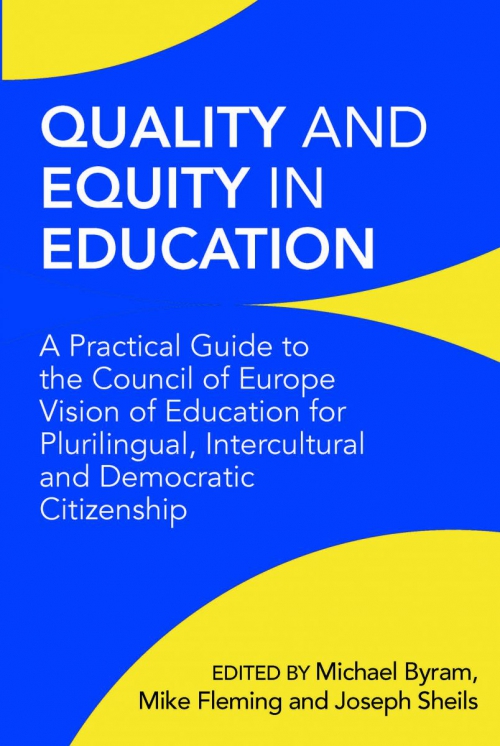 |
|
Byram Michael, Fleming Mike, Sheils Joseph (2023), Quality and equity in education: A practical guide to the Council of Europe vision of education for plurilingual, intercultural and democratic citizenship, Multilingual Matters, www.multilingual-matters.com/page/detail/Quality-and-Equity-in-Education/?k=9781800414020.
Gallagher-Brett, Angela & Lechner, Chrisitine (2023), “Helping language teachers in Lithuania take their first action research steps during the COVID-19 pandemic: an online strategy”, Canadian Journal of Action Research, Vol. 23, No. 2 (2023): Action Research in the time of COVID-19, https://journals.nipissingu.ca/index.php/cjar/issue/view/45.
Lechner, Christine (2023), “Language teacher support and professional learning: the role of networks and action research”, in Rossner, Richard & Heyworth, Frank, Rethinking language education after the experience of Covid, Council of Europe, www.ecml.at/Portals/1/documents/ECML-resources/Rethinking-language-education-after-the-experience-of-Covid-EN.pdf.
Photo credit: Multilingual Matters
| |
|
|
National developments |
|
The Austrian Centre for Language Competence (ÖSZ) has launched its new website: www.oesz.at! |
|
The Austrian Centre for Language Competence (ÖSZ) has launched its new website: www.oesz.at!
The ÖSZ, a specialist institute commissioned by the Ministry of Education, is the national hub for language learning issues in Austria. It focuses on three major thematic areas: foreign language learning, German as a second or educational language and multilingualism. The resources section of the site, containing over 1000 publications for six languages, highlights the important role the ÖSZ plays in providing a service for teachers. In addition to promoting the goals and projects of the ÖSZ, the website also contains up to date news and event information and the “Sprachbox” newsletter. The new “Im Fokus” section is dedicated to longer articles on language-related topics. Photo credit: ÖSZ/ADOBE
| |
|
France: recent FEI articles, Report to Parliament on the French language |
|
France Éducation International: recent articles
France Éducation International, the national contact point for the European Centre for Modern Languages, promotes ECML projects and publications among language experts at national level, notably through articles and by helping to organise seminars.
Discover the latest contributions (available in French):
Report to Parliament on the French language – 2023 Edition
The enhanced edition of the Report to Parliament on the French language offers a wide range of situations, projects and stakeholders to generate an up to date picture of the situation of the French language in France and around the world.
Find out more about the policy to promote the French language and other languages detailed in this Report in the accompanying video clip.
Photo credit: France Éducation International
| |
|
Strategies for promoting the partner language – Promoting the French language in Germany – Promoting the German language in France |
|
Within the framework of the Treaty on Franco-German Cooperation, the respective French and German authorities signed a joint declaration on strategies to promote the language of the partner country. The strategies focus on promoting the learning of French in Germany and German in France as a vehicle for further developing the close relationship between the two countries and contributing to intercultural understanding. They concentrate in particular on exchange and mobility, teacher education, curriculum and qualifications, teaching quality and didactics, vocational education and training and the border region.
| |
|
Switzerland: upcoming conference, recent resources |
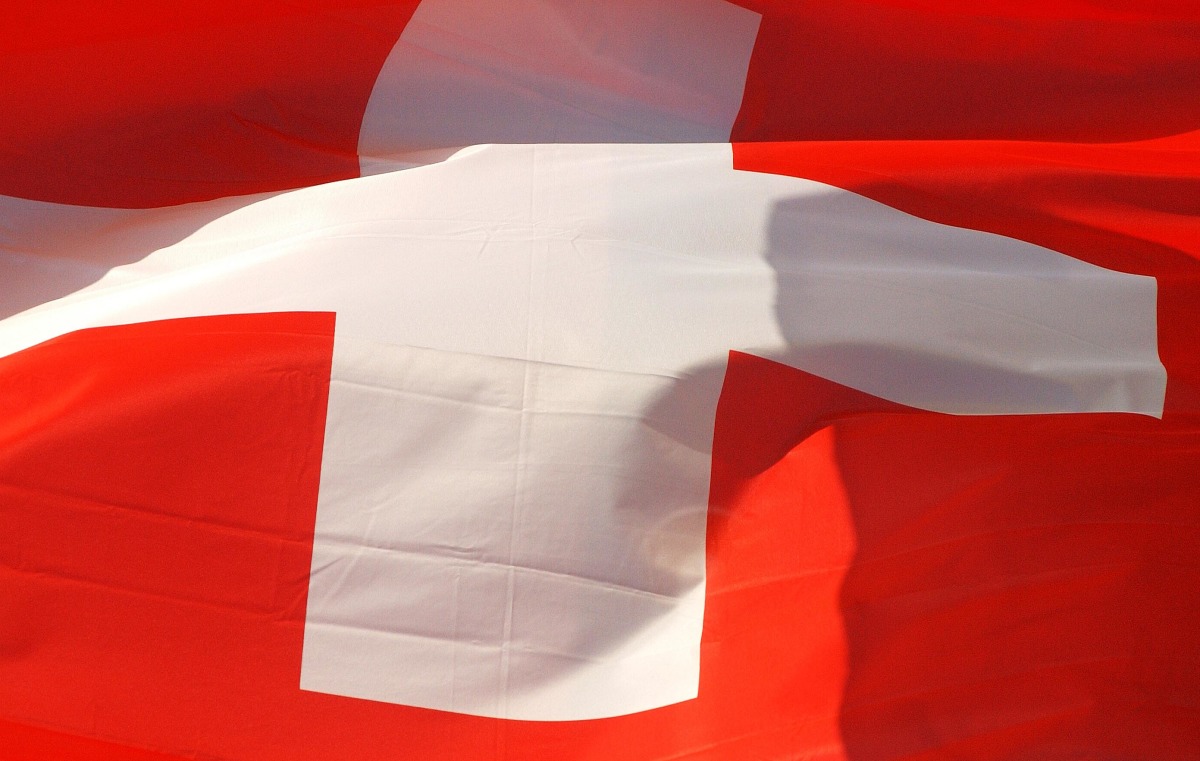 |
|
Conference: From empirical research to foreign language classroom practice and vice versa (Fribourg, 6-7 September 2024)
The conference, organised by the Expert Group for Language Teacher Education at the Zurich University of Teacher Education (PHZH) and the Centre for Foreign Language Teaching (CeDiLE) of the Fribourg University of Teacher Education (HEP Fribourg), will be dedicated to the creation and dissemination of knowledge on foreign language didactics.
Conference website
Project results “Immersion and bilingual education programmes in Switzerland: a critical literature review and a bibliographic database
The literature review focuses on research in the area of immersion projects in all language regions and at all school levels in Switzerland (pre-school, compulsory and post-compulsory schooling), especially from primary school onwards. Four topics are critically evaluated: Design of bilingual education, Language use and language level in bilingual education, Bilingual school subjects, Reasons that bilingual education programmes fail and succeed.
The project results are available here:
Recent resources
Grin, François, Masiero, Ilaria, The benefits of plurilingualism in Switzerland for individuals and for society at large – Summary, Report (available in English, French, German and Italian)
Heinzmann, Sybille, Ferris, Catherine, Roderer, Thomas, Ehrsam, Kristina, What does research tell us on the effects of student exchange in primary and secondary education? A systematic review of current research, Report (available in English, French, German and Italian)
Interview with Sybille Heinzmann (available in French and German)
Photo credit: Council of Europe
| |
|
|
Professional Network Forum of the ECML |
|
Forthcoming events of the Forum members |
|
The Professional Network Forum of the ECML is comprised of international associations and institutions that share common values and have overlapping expertise in the field of language education and assessment. Under the auspices of the ECML, the members of the Forum share their know-how and work together on areas of common interest in the service of language education.
Members of the Forum: ACTFL, AILA, ALTE, CEL/ELC, CercleS, EALTA, EAQUALS, ECSPM, ECML/Council of Europe, EDiLiC, EFNIL, EPA, EUNIC, FIPLV, IAM, ICC, OLBI.
Upcoming events of the network members
Dedicated ECML web pages
| |
|
American Council on the Teaching of Foreign Languages (ACTFL) |
|
|
|
Association of Language Testers in Europe (ALTE) |
 |
|
ALTE 60th meeting and conference – for members/associate members/individual expert members (Bad Homburg, Germany, 10-12 April 2024 & online)
The conference is designed for all those with an interest in the field of language testing. The theme of the conference day is “Closing the gap – Assessment for skilled labour”. It will include workshops, plenary presentations and also the ALTE Members’ update meeting.
ALTE’s partners for impact
ALTE has devoted a specific web page to its partners. ALTE has been collaborating with the Council of Europe since the 1990s. A few milestones are:
- 2003: participatory status as an International Non-Governmental Organisation (INGO) with the Council of Europe
- 2010: member of the Professional Network Forum on Language Education and cooperation agreement with the European Centre for Modern Languages (ECML)
- Contribution towards the development of the Common European Framework for Reference (CEFR)
- Publications on behalf of the Council of Europe
- Active collaboration, particularly on issues related to assessing migrants’ language competencies
Each Monday ALTE is also introducing one of its key partners on its LinkedIn channel.
| |
|
Evaluation and Accreditation of Quality in Language Services (Eaquals) |
|
Eaquals Annual International Conference 2024 (Lisbon, Portugal, 11-13 April 2024)
This year’s Eaquals Annual Conference will provide insights into the latest trends in language education, interactive workshops tailored to enhance professional skills and offer practical takeaways, networking opportunities to connect with peers, share experiences, and build connections. The event will be focusing on the following strands: Best practice in Language Teaching and Learning; Course Design, CEFR & Assessment; Leadership & Management; Continuing Professional Development (CPD); AI developments in Language Education.
| |
|
European Civil Society platform for multilingualism (ECSPM) |
|
2024 ECSPM Symposium “Plurilanguaging in multilingual educational spaces” (Ghent, Belgium, 22-23 May 2024)
See also the International events calendar of the ECML for events taking place around the world in the area of language education.
| |
|
|
Council of Europe |
|
Language Support for Migrants (LSM) Toolkit 2024 |
|
The LSM Toolkit has been created to meet both the specific needs of teachers providing language support in mainstream educational programmes or formal language learning settings, as well as the needs of teachers working in the compulsory school who are teaching different subjects to classes that include migrant children and adolescents. The Toolkit is also aimed at volunteers, who are often not trained language teachers and are working in the community, in refugee reception centres or alongside teachers.
The Toolkit consists of a set of 80 resources designed to guide educators who are providing these kinds of language support for adult migrants and migrant children in a wide range of contexts. Photo credit: Council of Europe
| |
|
European Charter for Regional or Minority Languages (ECRML) |
|
The European Charter for Regional or Minority Languages is the European convention for the protection and promotion of languages used by traditional minorities. Together with the Framework Convention for the Protection of National Minorities it constitutes the Council of Europe’s commitment to the protection of national minorities.
Recent reports
Follow the ECRML newsroom Photo credit: Council of Europe
| |
|
The Framework Convention for the Protection of National Minorities (FCNM) |
|
Resolutions on the implementation of the Framework Convention for the Protection of National Minorities by Albania and Austria (December 2023)
Developments on the implementation of the FCNM in Sweden: news item – media release
FCNM leaflet: now available in 20 different languages
The FCNM leaflet provides basic information on the Advisory Committee’s role and work, explains the monitoring process and illustrates the standards of the Framework Convention.
All language versions of the leaflet
Follow the newsroom of the FCPNM
Photo credit: Council of Europe
| |
|
Council of Europe online bookshop: recent publications |
|
European Charter for Regional or Minority Languages – Collected texts (3rd edition)
English – French
United around our values – Reykjavík declaration (2023)
English – French
Domino – A manual to use peer group education as a means to fight racism, xenophobia, anti-semitism and intolerance (Third edition) (2024)
English
Manual for the design of a training course on intercultural competence – Part 1 (2023)
English – French
Manual for the design of a training course on intercultural competence – Part 2 (2023)
English – French
| |
|
|
News from other organisations |
|
International Mother Tongue Day – 21 February |
|
UNESCO celebrates International Mother Language Day each year on 21 February since 2000.
The theme this year was “Multilingual education is a pillar of intergenerational learning”. Today, 40% of the world’s population cannot access education in their mother tongue, 250 million children and young people still do not attend school and 763 million adults do not master basic literacy skills. Mother tongue education supports learning, literacy and the acquisition of additional languages.
UNESCO organised a live event with two panel discussions on multilingual education as a key component of quality learning.
CGTN Europe: Interview with David Little on 21 February 2024
According to David Little, Associate Professor Emeritus, Trinity College, Dublin, teachers should encourage children to use their mother tongue in and outside the classroom.
Watch the video interview
Photo credit: UNESCO/Montakarn Suvanatap
| |
|
International Francophonie Day 2024: Honouring the French language |
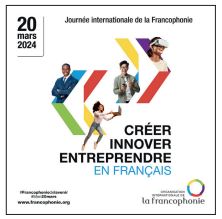 |
|
This year, the 29th edition of the French Language and Francophonie Week, entitled “On the podium”, celebrated French and sport – with the Paris 2024 Olympic and Paralympic Games taking place later this year. A variety of events took place at an international level from 16 to 24 March.
The theme chosen for the International Francophonie Day 2024, “Create, innovate, undertake in French”, highlighted the many opportunities and dynamism of the French-speaking world, encouraging creativity, innovation and entrepreneurship as levers for job creation for young people.
In France, Modern Languages Week (18-23 March) highlighted languages and linguistic diversity both inside and outside school around the topic “It’s all about communicating”, with the Olympic and Paralympic Games as its backdrop.
Along with English, French is one of the two official languages of the Council of Europe. The Organisation recently published Guidelines for the use of inclusive language in French and English.
Full ECML news item
Photo credit: Organisation Internationale de la Francophonie
| |
|
European Union |
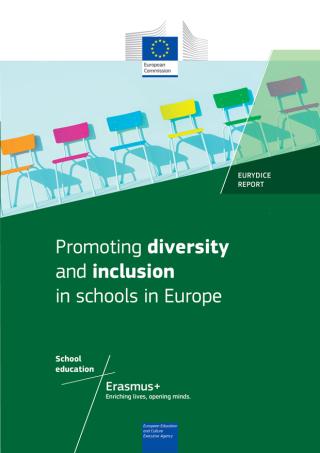 |
|
2023 – Eurydice publications
In 2023, Eurydice published a number of reports on various educational topics.
Overview
Key data on teaching languages at school in Europe – 2023 edition (available in English, Italian, Latvian, Portuguese and Spanish)
Promoting diversity and inclusion in schools in Europe (available in English, Croatian, Italian, Portuguese and Spanish)
AI report: by the European Digital Education Hub’s Squad on artificial intelligence in education (available in English)
Report “Assessing the European Union’s support to Regional and Minority Languages 10 years after the Alfonsi Resolution (2013-2023)”, prepared by Vicent Climent-Ferrando (UPF, UNESCO Chair in Linguistic Policies for Multilingualism) for the European Parliament.
Digital Language Equality in Europe
The EU-funded European Language Equality (ELE) initiative, that is working to promote Digital Language Equality in Europe, recently published the Strategic Research and Implementation Agenda (SRIA) for achieving full Digital Language Equality in Europe by 2030, the result of joint work of a wide range of stakeholders.
Photo credit: Eurydice
| |
|
Mercator – European Research Centre on Multilingualism and Language Learning |
 |
|
Mercator Network Newsletter
Issue no. 200 (February 2024)
Issue no. 201 (March 2024)
Issue no. 202 (April 2024)
Updated edition of the dossiers
“The Slovene language in education in Austria”
“The Lithuanian language in education in Poland”
OWL+ module on minority languages online!
The interactive module on minority languages provides relevant information for all language enthusiasts and education professionals who want to dive deep into minority language maintenance.
Discover the Latgalian, Mirandese, South Saami, and West Frisian languages and how they are integrated in education through quizzes, videos, interactive tasks, and get insights into the broader contexts of minority languages in Europe!
More information about OWL+
DIALECTOLOGIA: dialect classification of languages in Europe
Researchers from the Fryske Akademy, the University of the Basque Country and the Slovenian Academy of Sciences and Arts are working on the DIACLEU-project: Dialect Classifications of Languages in Europe. The aim of this project is to publish a complete, state-of-the-art and historical overview of dialect classifications of the endogenous languages spoken in Europe.
First result of the DIACLEU project: published in a special issue of the open access journal DIALECTOLOGIA.
This edition includes articles on Basque, Finnish, Gallo-Romance, Greenlandic, Irish, Italian, Luxembourgish, Norwegian and Welsh.
Full news item
| |
|
Babylonia, the Swiss Journal of Language Education |
|
|
|
|